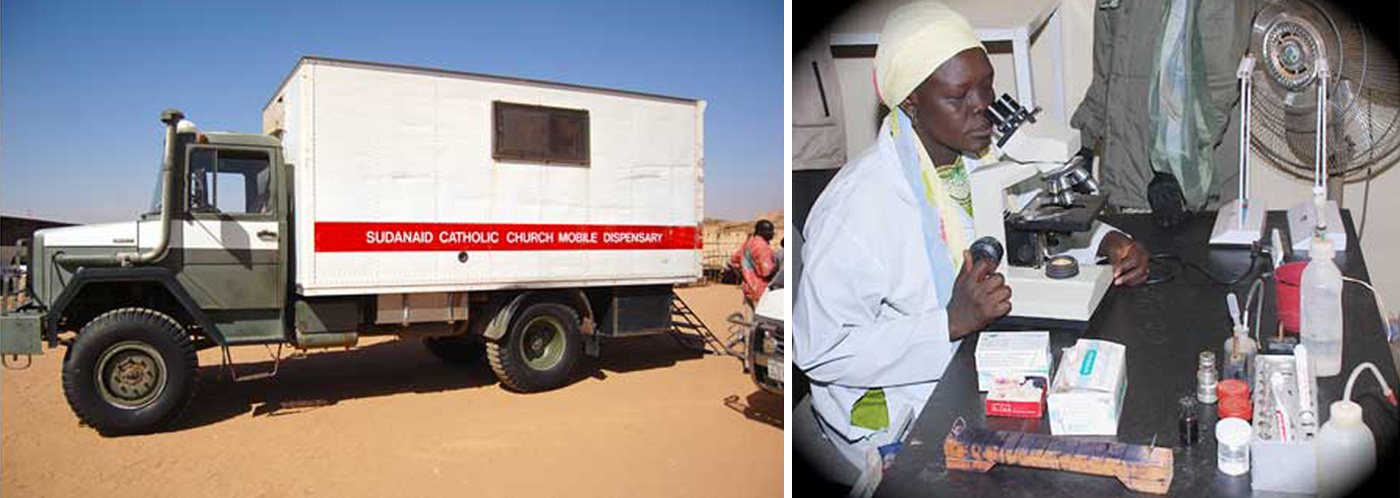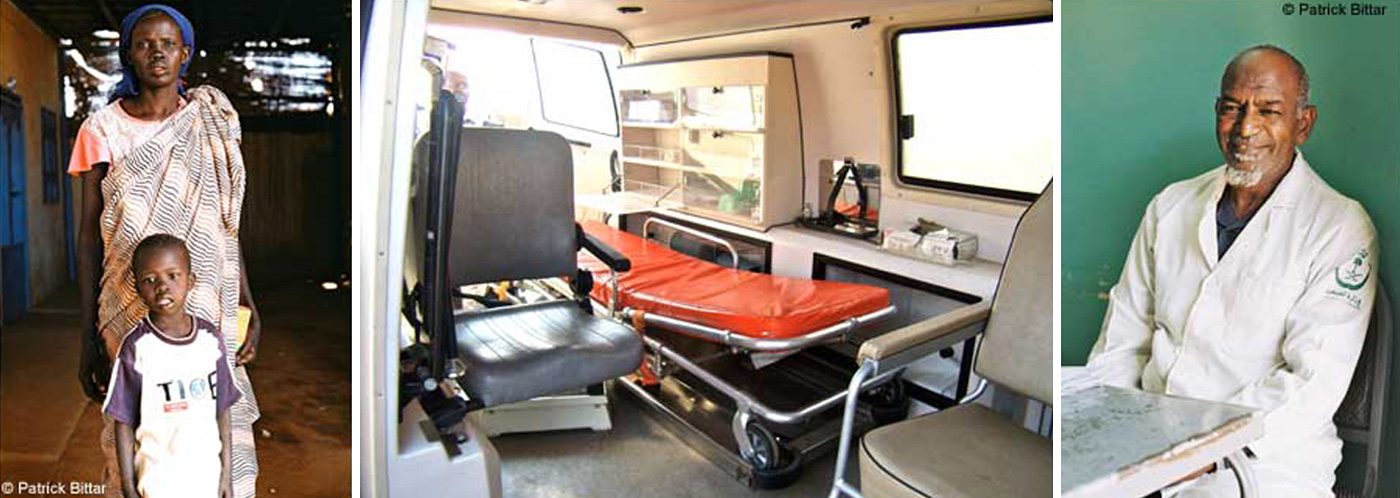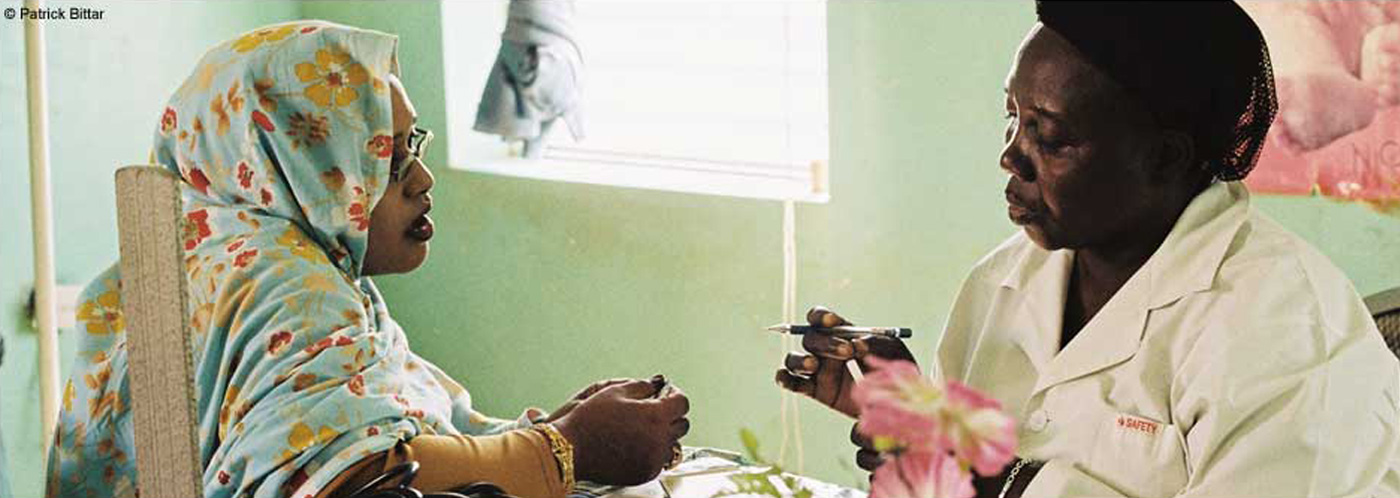Since 2015, ASASE no longer supports any program in Sudan.
Founded in 1990, this program, which coordinated the efforts of 70 people, all Sudanese (included 17 doctors and 5 chemists) , provided each year nearly 50 000 consultations.
In particular, it provided medical assistance to the population living in IDP camps around Khartoum, the capital of North-Sudan.
Living conditions in these camps was precarious, without basic sanitation, and often (for 70% of them) without access to water. As scrap and waste was everywhere, there were numerous wounds caused by glass and other metallic splinters and which, left untreated, could cause severe infections.
Some clinics were located in poor neighbourhoods of Khartoum itself.
In Khartoum, a basic consultation (without deeper analysis and prescription) from a doctor in a public hospital, used to cost about 3 CHF (2,5 €), and about 11 CHF (9€) in a private clinic; in the case of a specialist, fees could get as high as 50 CHF (41€).
The average monthly salary was 84 CHF (69€), and the population benefiting from this program, among the poorest of the poor, was often not able to buy itself a transportation ticket.
As it was very difficult for the target populations to move along, it was SVDP that used to come to them, either with mobile clinics or with health centres set up in their camps.
All needed drugs were bought in the country. Those distributed via mobile clinics were given free to the children of the Archdiocese schools and to the people living in remote camps. To the other patients was asked a 0.60 CHF (0,50 €) contribution, if they could afford it.
Each of our 4 dispensaries had its own laboratory, which enabled the doctors to optimize their care. This program also included:
- 3 health centres that were opened only on Fridays, the official Muslim day of rest;
- medical examinations in women's prisons (women were often detained with their babies);
- 6 sites visited weekly by two midwives and an ambulance dedicated to the monitoring of pregnant women (80% of births occured at home. In addition, according to Islamic law, mothers who gave birth to children out of wedlock were, according to the sharia law, liable to being stoned to death or to life imprisonment. Fear incited many of them to abort or to give birth clandestinely, in awful and often fatal conditions). Each year, 4000 women were benefitting from this obstetric follow-up.
- medical care provided to the children of our Street Children Program.
The most commonly treated diseases were: bronchitis, urinary tract infections, venereal diseases, malaria, gastroenteritis, diarrhoea, intestinal worms, arthritis, skin diseases, eye problems (3000 patients per year)...
In 2010, the cost of a consultation was 5.95 CHF (4,90 €), all charges and drugs included.
Deacon Robert Ferrua, in charge of Caritas Monaco, has visited the programs in March 2010. He reported:
"On Wednesday, we leave early in the morning to reach the Comboni Health Center, named after one of the two Sudanese Saints who founded the Combonian congregation. After a lively drive in the very busy streets of Khartoum, we leave the city and head towards the desert. After a few miles, we left the paved road to take a track in the desert, with no sign whatsoever, up to a camp of displaced people from Darfur.
How destitute, far below the poverty line! Many houses -if you can call it that- build out of bricks made of wet desert sand mixed with straw, then sun-dried. They consist of a ground floor only, and most often a surrounding wall. It is worth noting that these shelters for sub-poor people do not last long: they are not solid and constantly need to be rebuilt. You can see here and there the tents of the last arrived: they are made of sticks and recovered cardboard packaging, with jute bags roof.
The board "Saint Vincent de Paul Comboni Health Center" tells us that we have arrived, after having crossed several small donkey-driven karts that carried old oil drums filled with water.
We are greeted by the director of the center, a graduate from a Romanian university. This young, distinguished and highly skilled man is doing a wonderful job with very few resources.
Despite the lack of equipment, the center is very clean and tidy.
Nearly 12,000 patients are treated here every year. The center has an ambulance.
It is fairly complete, and divided into small rooms for each consultation:
- AIDS (some 30 persons daily),
- children vaccination
- nutrition (or rather malnutrition)
- gynaecology (more than 1500)
- dentistry
- ophthalmology (with only a single table with letters of various sizes)
- a small drugstore held by a nun, sister Charleen,
- minor operations (if ever serious surgery is needed, the ambulance can drive the patients to the hospital in Khartoum).
This is one of the 12 clinics run by Saint Vincent de Paul that we have visited in Sudan. It serves a population of over 500,000 people."





